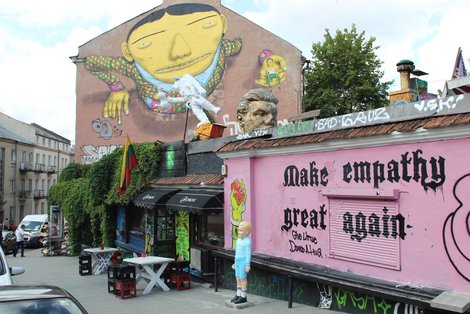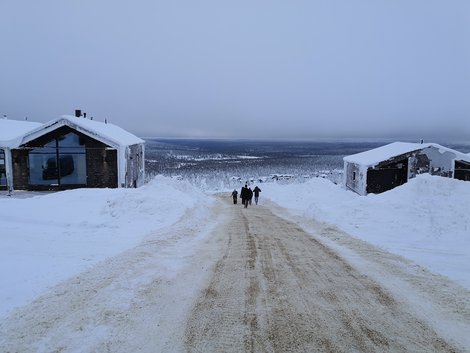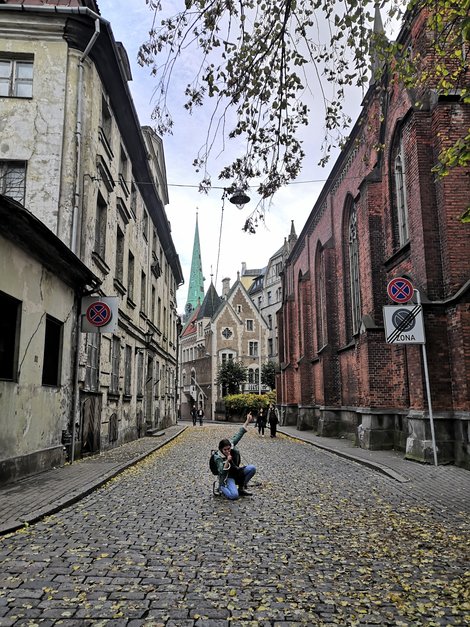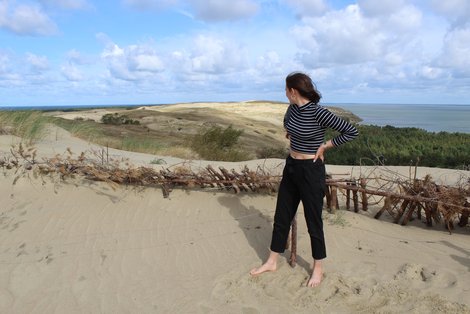It may be difficult to go abroad at the moment, but if you want to spend a semester abroad next winter semester, you should start planning now. Pauline Claußen visited a rather unusual country during her semester abroad: Lithuania. Less than three million inhabitants live in the Baltic state, which lies between Poland and Latvia. Pauline is studying industrial engineering and attended Vilnius Gediminas Technical University in the 2019/20 winter semester.
Why did you choose Lithuania and this university in particular?
It was clear to me relatively early on that I wanted to go to the Baltic States. I had to decide between the different countries. In the end, Lithuania appealed to me more because I knew less about the country. There are only a few people who can say anything about Lithuania and the culture, language and food there.
Then I compared the websites of the different universities and the one of Vilnius Gedimas Technical University was simply very well done. I was able to quickly find the information and subjects I was looking for and read the descriptions of the subjects straight away. I immediately wanted to take part and that's how I made my decision. Friends of mine who studied civil engineering there, for example, were very happy with the choice of subjects.
How did you travel to Lithuania?
My very first trip was by plane, which took just an hour and a half. But as I don't like flying because of the environment, I took the bus on the way back. But that's not without its drawbacks, as you're on the road for about 24 hours. Nevertheless, I didn't find the journey that stressful. The long-distance bus system in Eastern Europe is so well developed that I was able to travel from Vilnius to Berlin. From there, I changed to the Flixbus, which went directly to Clausthal.
How did your first week go?
It was very easy to get started because we were assigned a tutor beforehand. We were also able to ask all kinds of questions in Facebook groups. On site, the week began in the traditional way with an introductory event. I was able to talk to the others and make my first contacts. Among other things, there was a scavenger hunt through the city and a barbecue by the lake. Even as a very shy person, you are not forgotten: you can attend various appointments and events.
However, I found the course selection a bit stressful: I was able to choose them beforehand and discuss them with the student advisors, but not everything worked out so well. This was because some courses were understaffed. However, very good alternatives were offered.
You lived in a hall of residence during your semester. What was it like there?
In general, rents in Lithuania are very low. Double dormitory rooms with their own kitchen and bathroom cost 150 euros per month and an apartment in the city center costs around 300 euros per room in a central location. It was therefore not easy for me to decide between an apartment and a hall of residence. In the end, however, I opted for the hall of residence. I had also decided not to live in a room with someone from Germany because I wanted to experience new cultural impressions. And that's what I got: My roommate's name was Natalia and she was from Madrid. As I don't speak Spanish and she doesn't speak German, we spoke English all the time.
What were your favorite courses and how did they go?
One of my favorite courses was Comparative Economics. I found it very interesting because you evaluated and compared different countries and their development processes in different decades and used practical examples. But in general, the courses were very practice-oriented. There was a classroom feeling on site: smaller rooms, sitting at tables and benches, and always around 20 people per course. There were lots of lectures and written assignments and some written exams, but these were weighted less heavily. What I liked were the midterms. We wrote two exams, one in the middle of the semester and one at the end. You didn't have to recapitulate so much and I had the feeling that it was also more relaxed not having to learn everything at once.
I was able to get a total of 21 credits that I collected during the semester. I didn't expect to be able to collect so many credits during a semester abroad.
What did you do in your free time?
I did a lot of sport and traveled a lot, e.g. to Finland. For six euros you get a monthly ticket and can then use the whole bus system in the city. The car sharing system is also well developed. It's called CityBee there. You could drive from one country to the next and visit neighboring cities. We also visited the Hill of Crosses, a mountain with lots of crosses. But it's totally out of the way and not so easy to get to by bus. CityBee was really handy there.
I was also able to take part in a bus trip to Finland through the Erasmus program. It takes about a day and a half to get there, but it was definitely worth it. The trip also went by quickly as the time with my fellow students was very entertaining. After all, everyone who takes part in something like this is open-minded and there for the same purpose: to have fun and learn something new.
What do you remember in particular?
I particularly remember the intensity of the new experiences. You go somewhere and know nothing, and yet you feel at home after just a short time. The experiences you have in a completely foreign country are impressive and somehow also quite overwhelming.
And last but not least: Are you still in contact with people from Lithuania?
I'm still in contact with people from Germany, but contact with people from Lithuania has unfortunately died down very quickly. However, I still have very intensive contact with one friend. He was there for a whole year and told me about his experiences in the second half of the year: what he did differently, what he thought was great. You take even more with you because you stick to the structures and attend organized events and trips, especially at the beginning. In the second semester, you are a bit more independent, know your way around better and get to know parts of the city that are not so well known, for example.
Would Lithuania be something for you? Then find out more here: www.izc.tu-clausthal.de/wege-ins-ausland





